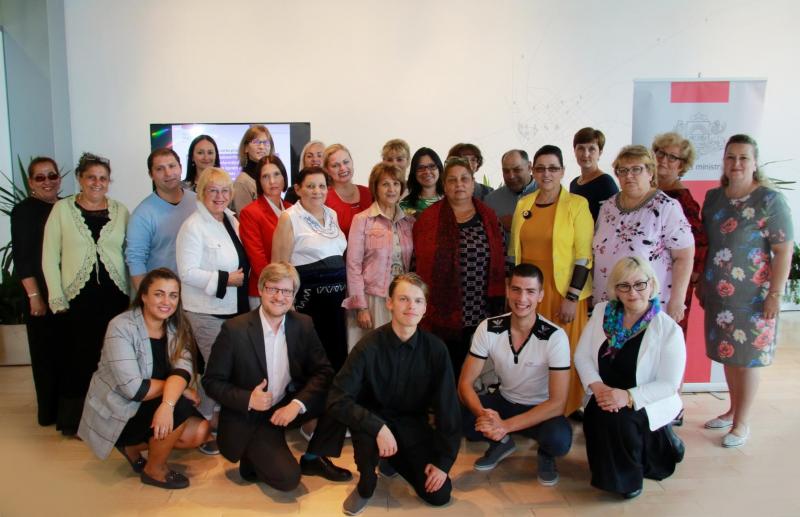This project is continuation of the previous project “Latvian Roma platform II: dialogue, participation and mutual learning”.
The Ministry of Culture as the National Roma contact point provides effective coordination at the national, regional and local level. Latvian municipalities, which are responsible for social inclusion of their population, including Roma families at the local level, still have organised insufficient number of activities to facilitate integration of Roma into society effectively. The Ministry provides support to municipalities in order to strengthen them to implement active policy towards Roma inclusion in accordance with the national set of policy measures on Roma integration, including developing dialogue between Roma families and municipalities.
Main objective of the project is to develop the Latvian Roma platform as a mechanism for coordination and implementation of the set of policy measures on Roma integration at the national, regional and local level by fostering mutual cooperation and exchange of experience between all stakeholders, and also supporting the involvement of Roma, especially Roma youth and women, in the development of civil society and intercultural dialogue.
Objectives:
- To foster cooperation and dialogue between Roma representatives, local authorities, representatives of municipalities and governmental sector, as well as social partners;
- To support mutual learning and exchange of best practices on Roma integration and social inclusion in key areas at the local and regional level;
- To facilitate the capacity building, empowerment and effective involvement of the representatives of Roma community, especially Roma youth, into the implementation of the set of Roma integration policy measures, as well as to foster the capacity and skills of representatives of Roma civil society, especially Roma youth.
- To promote the awareness of the society, especially the main stakeholders about Latvian Roma culture, history and social situation, and to popularize success stories of the Roma involved within the Platform in the majority society.
In the result of the implementation of the project’s activities:
- Mutual learning and exchange of best practices on Roma integration in key areas at the local and regional level has been supported. For example, Regional experts working meetings and good practice visits to the Rezekne municipality (Malta parish) and Viļaka municipality are organised.
- Roma mediation practice in the municipalities and effective dialogue between Roma families and state/ municipal authorities (schools, social services, city councils) are developed. During the project four trained Roma mediators cooperated with 125 disadvantaged Roma families and provided assistance to more than 150 Roma persons. Local government’ representatives who cooperated with the Roma mediators stated that the mediator helped them to improve dialogue with Roma families and to find appropriate solutions for solving many problems, as well as to inform about the most urgent needs of the Roma and the characteristics of traditional Roma culture. Moreover, mediators facilitated Roma access to municipal services, European Social Fund support programs, as well as prevented drop-out rates of Roma pupils in schools.
- Considering assessment of the Roma meditators’ work results and cooperation experience, starting from October 2018, Jelgava city and Ventspils city local councils have ensured co-financing for activities of the Roma mediators in their cities. This good practice will be developed further by attracting new local government and Roma activists.
- In order to facilitate support of Roma mediators, assessing Roma mediators’ work experience and achieved results, every year best practice exchange seminar on Roma mediators’ work in municipalities is held.
- The participation and involvement of the representatives of Roma community into the implementation of the set of Roma integration policy measures is facilitated; as well as the capacity and skills of representatives of Roma civil society has been strengthened. The workshops are organised in order to empower and facilitate participation of the Roma young people and Roma women in the development of civil society.
- Coordination of the implementation of the set of policy measures on Roma integration has been improved at the national, regional and local level. Significant number of new stakeholders, especially Roma activists are involved in the process of implementation the Roma integration policy, especially at the local level.
- Expert discussion “Coordination of Roma integration policy implementation in countries with a small Roma population” was organized by the Ministry of Culture in cooperation with the Council of Europe Ad hoc Committee of Experts on Roma and Travellers Issues (CAHROM). Experts from Georgia, Estonia, Lithuania, Norway, Finland and Slovenia, an expert from the European Centre for Minority Issues, as well as national representatives from the responsible ministries and state agencies, regional experts in Roma integration issues from 11 Latvian municipalities and representatives of the Roma civil society were actively participated in the discussion. Discussion results are summarized in the Thematic visit report, which reflects practices of development and coordination of Roma integration policy in countries with a small Roma population.
- The awareness of the society about Latvian Roma culture, history and social situation are raised, and personal success stories of the Roma are popularized in the public media. For example, a seminar “Many faces of Latvian Roma culture” was organised and informative booklet “A Short Introduction to Latvian Romani Culture” was elaborated and published.




